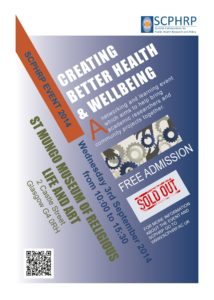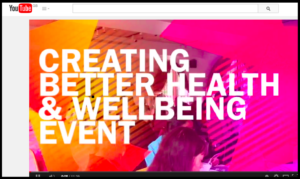 This one-day networking and learning event was organised by members of the Adult Life/Working Age Working Group at SCPHRP. It aimed to help bring academic researchers and community organisations together to discuss methods and experiences of improving health and wellbeing and reducing health inequalities in Scotland. The main objectives for the day were:
This one-day networking and learning event was organised by members of the Adult Life/Working Age Working Group at SCPHRP. It aimed to help bring academic researchers and community organisations together to discuss methods and experiences of improving health and wellbeing and reducing health inequalities in Scotland. The main objectives for the day were:
- Showcasing some on-the-ground work
- Improving understanding between community organisations and researchers
- Increasing the likelihood of future connections between academia and community organisations
The event was advertised through various channels and networks and attracted 50 participants from across research, policy and practice (healthcare and the third sector).
Sandra Carlisle from the University of Aberdeen was invited to give a keynote presentation on ‘Community-Based Action Research’. Five community / Third Sector organisations and one academic group that have had experience of collaborations between researchers and community organisations (either past or present) were identified through their links to NHS Health Scotland, Community Health Exchange / Scottish Community Development Centre and SCPHRP and invited to lead case study discussion groups around experiences of their organisations and relevant projects. Key themes about collaborating that emerged included: the importance of trust and equal engagement/partnership from the outset; the need to generate the right kinds of evidence; the limits placed on projects by time and funding constraints; and the added value that can be generated compared to within-sector only collaborations.
This was followed in the programme with some tai chi to re-energise the attendees after lunch (there’s nothing like embarrassing yourself along with a room full of people to help break the ice!). The re-energised room then participated in another round-table discussion session, this time using the World Café method to produce an iterative account of people’s experiences of the research process. Five topics were discussed: Starting; Keeping it Going; Evidence; Reporting; and Impact. Key themes emerging included: the need for strong and transparent foundations (starting); the importance of key ‘champions’ within the collaboration (keeping it going); the need for strong theory and plausible mechanisms (evidence); awareness that reporting may be a stepping-stone rather than an end-point in the collaboration (reporting); and the hierarchy of evidence will be an important factor in impact, especially to funders (impact).
To finish the day Garth Reid, NHS Health Scotland, and Ian Shankland, Lanarkshire Community Food and Health Partnership, superbly summed up the day and suggested some next steps for the group. Some of these next steps included: the need for quality knowledge capture mechanisms across sectors; other opportunities for community groups and researchers to link up and maintain relationships through the various stages; and evidence of good-practice from the likes of our case studies.
Overall, the event was deemed a success in meeting the objectives of showcasing work, building knowledge around the collaborative research process and strengthening ties between community organisations and researchers. It will be important to capitalise on the energy, networks and shared learning that happened on the day. SCPHRP and the Adult Life / Working Age working group will aim to do this through continued engagement with all attendees who wish to continue in dialogue and action around improving health in Scotland. Through the report and video outputs, including some excellent graphics from the day provided by Chris Shipton, we hope that people will be able to use some of the learning and themes that emerged during the discussions to inform their own work practices and collaborations.
REPORT (click image for pdf)
VIDEO (click image for YouTube link)





